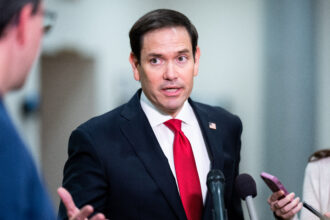The United Auto Workers union expanded its strike Friday, bringing the number of employees who walked off the job to demand higher wages and better benefits from Detroit’s Big Three carmakers to 25,000. Republicans vying for the White House next year are using the moment as an opportunity to rail against President Joe Biden’s climate policies.
“Yesterday, Joe Biden came to Michigan to pose for photos at the picket line. But it’s his policies that sent Michigan autoworkers to the unemployment line,” former President Donald Trump, the GOP frontrunner, told a crowd of non-unionized autoworkers in Michigan on Wednesday. “He’s selling you out to China, he’s selling you out to the environmental extremists and the radical left.”
That message was parroted later that evening by his rivals at the second GOP presidential debate, which Trump skipped.
“It’s not climate change we need to worry about,” said North Dakota Gov. Doug Burgum. “It’s the Biden climate policies.”
“One of the signature accomplishments of our administration was in just a few short years we achieved energy independence,” former Vice President Mike Pence added. “But on day one, Joe Biden declared a war on energy.”
As much of the world pivots at an unprecedented speed toward cleaner sources of transportation and energy to mitigate the worsening climate crisis, the United Auto Workers union strike has become the latest GOP culture war talking point and a new front line in the 2024 presidential race.
It’s unclear if the GOP’s message is resonating with the striking autoworkers. Some have publicly expressed support for Trump and disdain for EVs. Union leadership, however, has made it clear that they’re not buying it.
“I don’t think the man has any bit of care about what our workers stand for, what the working class stands for,” UAW President Shawn Fain said about Trump in an interview with CNN. “He serves the billionaire class and that’s what’s wrong with this country.”
More than 10 million electric vehicles were sold worldwide last year, accounting for a record 14 percent of total new car sales, according to the International Energy Agency. And more than 670,000 hybrid and fully electric vehicles were sold in the United States alone during the first half of 2023. Global manufacturers of EVs and batteries have also been expanding their operations in the U.S., signaling what could become a new green energy hub in the American South.
Much of that growth, at least in the U.S., is being driven by the roughly $370 billion made available for clean energy and climate efforts from the Inflation Reduction Act, the Democrats’ sweeping spending package passed last year and Biden’s signature accomplishment in the fight against global warming.
More recently, the law has fallen in the crosshairs of Republicans promising to put an end to “Bidenomics” and “woke finances.” GOP lawmakers, mostly following the lead of a small group of rightwing hardliners in the House, have tried several times this year to force spending cuts to IRA clean energy tax credits, including during the debt ceiling debate this spring and during the federal budget negotiations this summer.
That fight reignited this month, threatening to send the U.S. into a government shutdown over the weekend. If Congress can’t come up with a timely resolution, the consequences would go beyond federal employees missing their paychecks. Those hoping to buy a new home, for example, might be unable to obtain flood insurance if Congress doesn’t reauthorize the National Flood Insurance Program. And billions of dollars in federal disaster aid could be withheld from some of the communities hardest hit by climate change, including Puerto Rico.
On Thursday, Republican Sen. J.D. Vance from Ohio, introduced the latest GOP bill aimed at curbing Biden’s climate agenda. Not only would Vance’s bill eliminate federal tax credits for electric vehicles, but it would also establish a new $7,500 tax credit specifically for American-made gas-powered vehicles. “We can secure a bright future for American autoworkers by passing this legislation and reversing the misguided policies of the Biden administration,” he said.
More Top Climate News
Food Prices Are Rising. Blame Climate Change, El Niño and Russia’s War: Global food prices for staples like rice, cooking oil and onions are on the rise as nations impose export restrictions to mitigate their own food shortages, caused in part by climate change, Aniruddha Ghosal, Evelyne Musambi and Joeal Calupitan report for the Associated Press. Historic drought, floods and other climate-driven extreme weather is damaging crops and adding to other stress points on the world’s food systems, including rising transportation costs associated with the ongoing Russian war in Ukraine.
Biden Administration Says It Will “Phase Down” Offshore Oil and Gas Drilling: The Biden administration released a new oil and gas lease plan today, calling it a “phase down” of the nation’s offshore drilling in line with the president’s goal of reaching net-zero greenhouse gas emissions by 2050. It includes the fewest lease sales ever offered in a five-year plan, including none off the Atlantic, Pacific or Alaskan coasts. But any new drilling beyond what’s already approved jeopardizes international climate goals under the Paris Agreement, and climate advocates see the plan as another reminder of Biden’s broken promise to end fossil fuel development on federal lands and waters. —Nicholas Kusnetz
Reaching Net Zero Emissions by 2050 Is Still Within Reach, Says IEA: Global greenhouse gas emissions continue to rise. But the path is still open to reach net-zero emissions by 2050 and limit global warming to 1.5 degrees Celsius, which scientists say is necessary to avoid the worst effects of climate change, Jeff Brady reports for NPR. That’s the message from the International Energy Agency’s latest report, which found that the Paris Agreement goals can still be reached if nation’s curb fossil fuel production and triple renewable energy investments to $4.5 trillion a year by the early 2030s.
Today’s Indicator
63,000
That’s how many deaths are expected to occur each year in the U.S. due to extreme heat if Earth’s average temperature rises 3°C by the end of the century, according to a new study. Scientists project the planet warming by at least 2.8°C if more isn’t done to bring down emissions.



















